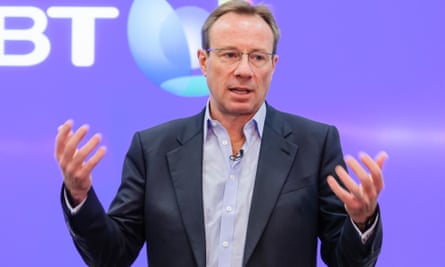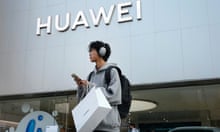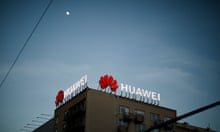The chief executive of BT has said it would be impossible to strip Huawei products out of the UK’s telecommunications network within the next decade.
Philip Jansen also warned of “outages” and possible security risks if the sector was told to curtail all business with the Chinese technology company during the building of the 5G network upgrade.
His comments follow suggestions that a decision on the future of Huawei in the UK is due to be made public by the culture secretary, Oliver Dowden, on Tuesday.
Dowden, speaking last week, said US sanctions on Huawei were likely to have a significant impact on its ability to play a role in the UK’s 5G network.
Speaking since, the Cabinet Office minister, Michael Gove, said a decision on Huawei would be made by the national security council and announced to parliament.
Jansen told BBC Radio 4’s Today programme: “Huawei has been in the telecoms infrastructure for about 20 years and a big supplier to BT and many others in the UK telecoms industry.
“It is all about timing and balance. So if you want to have no Huawei in the whole of the telecoms infrastructure across the whole of the UK, I think that’s impossible to do in under 10 years.”
Jansen said the industry would want to be given a seven-year window to remove Huawei from the 5G network, but said “we could probably do it in five”.

He said there would be consequences for the UK as a result of rejecting business with Chinese company. “At BT and in our discussions with GCHQ, we always take the [view] that security is paramount; it is our No 1 priority.
“But we need to make sure that any change of direction doesn’t lead to more risk in the short term – I think that’s where the detail really matters. If we get in a situation where things need to go very fast, then we go into a situation where service for 24 million BT Group mobile customers is put into question – outages would be possible.
“Secondly, the security and safety in the short-term could be put at risk – this is really critical here. If you are not able to buy or transact with Huawei that would mean you wouldn’t be able to get software upgrades if you take it to its specificity.”
Jansen said there was a danger that “accelerating the rip-out” of Huawei from the 5G network meant that not enough effort was being put into extending the service provision across the country.
BT and Vodafone have said the cost of removing Huawei equipment would run to billions of pounds, and could be passed on to consumers.
According to reports, the government is to order that Huawei equipment be removed from the UK’s 5G network by 2025. About two-thirds of BT-owned EE’s 5G network consists of Huawei equipment, with one-third supplied by Nokia. Vodafone relies on Huawei for about one-third of its 5G network equipment, the remainder is supplied by Ericsson.
Huawei UK’s chairman, John Browne, a former chief executive of BP, has said the moves against the Chinese company are political and that it has “become a football between the United States and China”.
A US ban prevents Huawei from using American microchips or any chips designed with US software. After the announcement of a probable UK ban, a technical review by Britain’s National Cyber Security Centre is expected to conclude that Huawei equipment cannot be guaranteed to be secure because it will have to rely on untested chips.
Huawei, the market leader in the supply of 5G equipment, has always maintained that it is a private company independent of the Chinese state.
In January, the UK government announced that mobile operators in Britain would only be allowed to use Huawei equipment for up to 35% of their 5G networks, and only in non-core parts.
Boris Johnson, as part of his election manifesto, promised to ensure faster broadband and internet speeds across the UK to “level-up” the country’s regions. The government’s target of delivering gigabit speed broadband to every UK home by the middle of the decade could be under threat if operators including BT, which owns broadband infrastructure company Openreach, have to spend too much time and investment on removing Huawei equipment across their networks.








